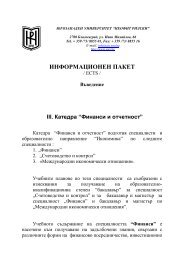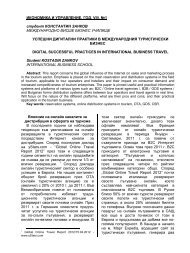ÐÑой 2/2005 - СÑопанÑки ÑакÑлÑÐµÑ - Югозападен ÑнивеÑÑиÑеÑ
ÐÑой 2/2005 - СÑопанÑки ÑакÑлÑÐµÑ - Югозападен ÑнивеÑÑиÑеÑ
ÐÑой 2/2005 - СÑопанÑки ÑакÑлÑÐµÑ - Югозападен ÑнивеÑÑиÑеÑ
- No tags were found...
Create successful ePaper yourself
Turn your PDF publications into a flip-book with our unique Google optimized e-Paper software.
enable them to cover a number ofcountries.For banks throughout Europe, the questionis primarily one of where they see the roleof payments within their business. Thyereare four general approaches to this:-payments can be seen as “enabling” otherservices;-payments can be seen as “driving” otherservices;-payments can be seen as being bothessential and core to the business;-payments can be seen as being the basisfor further differentiation of services.Until this basic question is defined andresolved, banks are seemingly currentlyunable to their commercial propositions fortheir corporate clients. Therefore, bankswhich are able to offer constructivecorporate propositions - sooner rather thanlater – will, in all likelihood, win customersfrom banks which are slower off the mark.Such proposals will inevitably include anenrichment of both their product and serviceranges, together with how they intend torepresent large-scale payments operations.They will also be forced to make a greaterdifferentiation of their customer bases inorder that they can be seen to offer addedvalue.It is unlikely that every bank will involveitself in the payments aspect of thebusiness, owing to the high cost of pre-SEPA investment requirements and,because of the higher cost of post-SEPAtransactions. This will invoke morepartnerships between banks. It wil alsoprobably ensure that the high level ofmergers, take-overs and acquisitions bybanks within Europe, will continue to remainat a high level. The larger the bank, themore easily the adjustment to SEPA will be,because large banks have both the scaleand the client-base to manage their ownpayments systems as well as to in-sourcethe payments of smaller banks.For many banks the evolution of SEPArepresents a negative development. Thenecessary investment in technologies(which for some banks will represent hugeamounts) wil materially drain their reserves.3This, coupled with the reduction in feeswhich banks wil be able to charge for crossborder,post-SEPA transactions willsqueeze the margins of all banks. There willalso be the attendant costs of theimplementation of this technology. Apartfrom this, there will have to be afundamental change in banking philosophy,whereby banks will have to learn to become‘country-neutral’, and adopt a pan-European perspective.There are very few banks which have theeconomies of scale, the structure and theleverage to operate in a ‘zero-margin’ pan-European operation. The largest of theseare: ABN-Amro, BNP, Deutsche,JPMorgan, Chase and Citigroup. They wiltry to win over corporate clients which havepan-European Euro-zone operations. Sucha mover, might well be underscored bythese banks offering out-sourcing servicesto smaller banks in order to process theircross-border payment transactions.Domestic banks will probably, in any case,out-source their cross-border paymenttransactions, because such transactionsform only a very small part of theirbusiness. Most of their customer base donot make cross-border payments on aregular basis. This is particularly true ofthose banks which have concentrated theirbusiness activity within the retail bankingsector.All this, will have particular meaning forBulgaria and Romania. By the time of thepolitical accession of these countries, it isexpected that SEPA will be a reality. Thismeans that all Bulgarian banks will have toharmonize both their securities and theirpayments systems with SEPA. This alsomeans that the infrastructure of bothClearing and settlements systems will haveto become fully integrated. The underlyingaim in al this harmonization and integration,is, of course, the systemic reduction of riskwithin the financial sector, while alsoensuring that the domestic infrastructuresare effective vehicles which ensure faircompetition amongst al the enlarged EUand particularly Euro-zone participants. [For
















